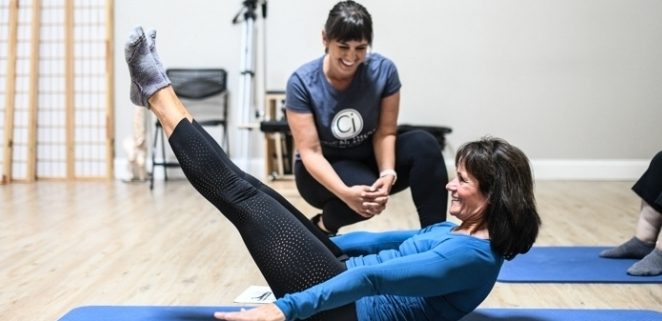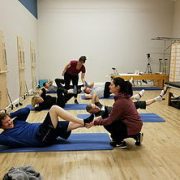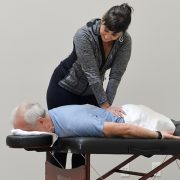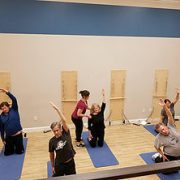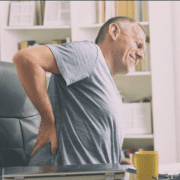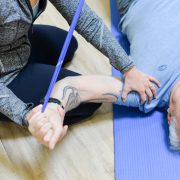5 Signs Your Core is Weak – And What You Should Do About It!
A strong, healthy core is important for our health and posture. When your core is strong and working properly, you will have less back pain, better posture, and will move with more ease and endurance. But how do you know if your core strength is where it needs to be?
Here are five signs that might indicate your core is weak and what you can do about it:
1. Your Back Hurts
The most common side effect of a weak core is back pain. Your core’s job is to support your spine and act as the center from which all movement stems. If those muscles are not properly conditioned – meaning, if they aren’t conditioned to engage when they are supposed to – your spine is at risk for being overworked and muscular strain and tension is inevitable.
What can you do? When it comes to back pain, it’s really important that you talk to an expert about how to properly strengthen your core. Don’t go at it haphazardly. A lot of people jump to core strengthening to fix their back pain when there are other things that need to be addressed first. Without proper guidance, you could make your back worse doing the very thing that is meant to help you.
2. You Have Poor Balance
Believe it or not, it’s not just your feet and ankles that help you balance. Your core strength plays a huge role in this as well. Your core muscles surround your pelvis and help to stabilize it – if those muscles are weak – particularly your hips and glutes – your balance will undoubtedly be affected.
What can you do? Work your core in a functional manner. If you’re already practicing balance exercises, don’t just hope for sheer luck. Actively focus on the connection between your foot and your deep core. You’ll be surprised at what this visualization will do for both your balance and core activation. If you struggle with this – then it’s a good idea to work with an expert who can help you.
3. You slouch all the time
If you’re struggling to maintain good posture – you might have a weak core. Observe your posture right now. Are your shoulders rolled forward? Is your low back missing its natural curve? Is your head poked forward? When you go to correct your posture – does it feel difficult or tiresome to maintain? If so, your core might need some endurance-training.
What can you do? This is a situation where consistent core training will carry over into your sitting posture. Your postural stabilizers are what allow you to sustain prolonged sitting and standing postures. The more accustomed they are to being activated and working – the more likely they will naturally kick in when you’re standing and sitting. Over time, it will become easier to maintain good posture and with a lot less effort.
4. Your feet and wrists hurt
When you have a weak core – and lack the proper central support and stability you need – your outer muscles and joints will eventually suffer. We already talked about balance. If your core isn’t working to help you stay more stable, your feet will have to work harder, resulting in overtaxing of the tissue on the bottom of your foot. If your middle back can’t support you when you’re pushing or pulling, your wrists will take the brunt and this can result in stiffness or pain over time. If you’ve got any chronic problem that isn’t getting resolved over time, something is missing. In the case of your wrists and feet – it could be a weak or underfunctioning core.
What can you do? If you’ve been trying to resolve your foot or wrist pain for a while and aren’t getting the results you hoped for – consider shifting your focus to deep core training. I’m not talking sit-ups and crunches, I’m talking about deep stability training that is going to result in a better balanced body – where your wrists, core, and feet are all connected and working together. Something like Pilates can help you achieve this – provided you’re working with a highly skilled instructor. Pilates is specifically designed to strengthen your core in a way that emphasizes full body strength.
5. You’re always holding your breath
If you’re always being reminded to breathe when you move or exercise, it’s a sign your core might not be working properly. Your deep core is made up in part by your diaphragm, which is your main breathing muscle. When your core lacks stability, or in most cases, doesn’t know how to engage in the right way, your diaphragm will contract to compensate. One of the most tell-tale signs that this is happening is that you always hold your breath during exercise.
What can you do? I always say – when in doubt – just breathe. If you’re breathing through every movement then your diaphragm can’t stay contracted. Start here. If you notice that other things start to get tight and uncomfortable as a result – namely your hips and your neck – then it means you’re now using those muscles instead of your diaphragm to compensate for your weak core. In that case – consider getting expert help because these movement patterns are hard to break on your own.
If any of these signs sound familiar to you, then you might want to start paying more attention to your core strength!
There’s so much more to a strong core than 6-pack abs and the ability to hold a plank for days. Pay attention to the more subtle signs I’ve just outlined for you. If you’re noticing one or more – it could be a sign that your core needs some extra love and attention – and the you need to learn how to strengthen it properly.
Are you local to Portsmouth, NH?
Check out our Pilates offerings and other services here. We have specialists who may be able to help you strengthen your core properly – from the inside out.
Dr. Carrie Jose, Physical Therapist and Pilates expert, owns CJ Physical Therapy & Pilates in Portsmouth and writes for Seacoast Media Group. To get in touch, email her at [email protected].

